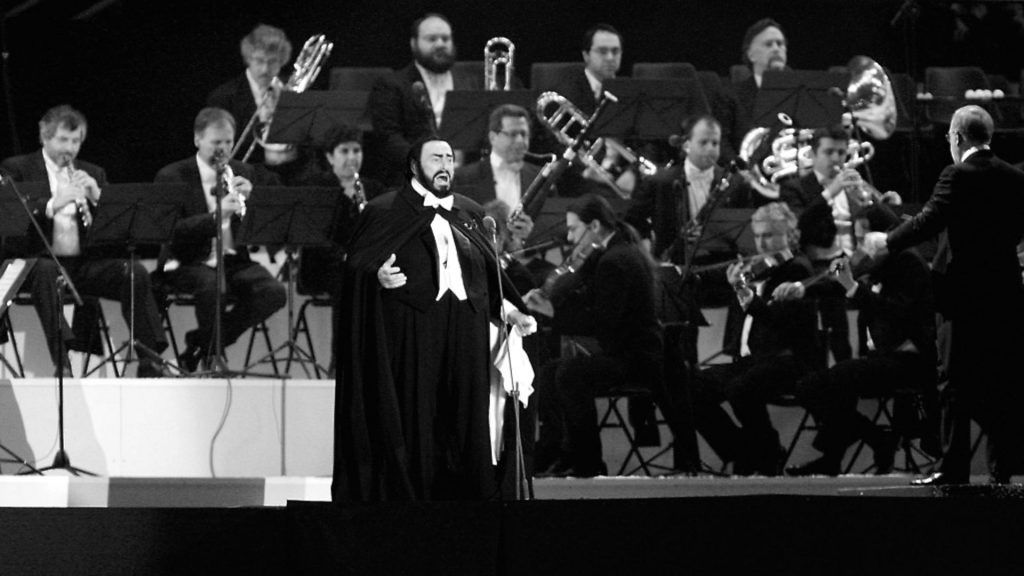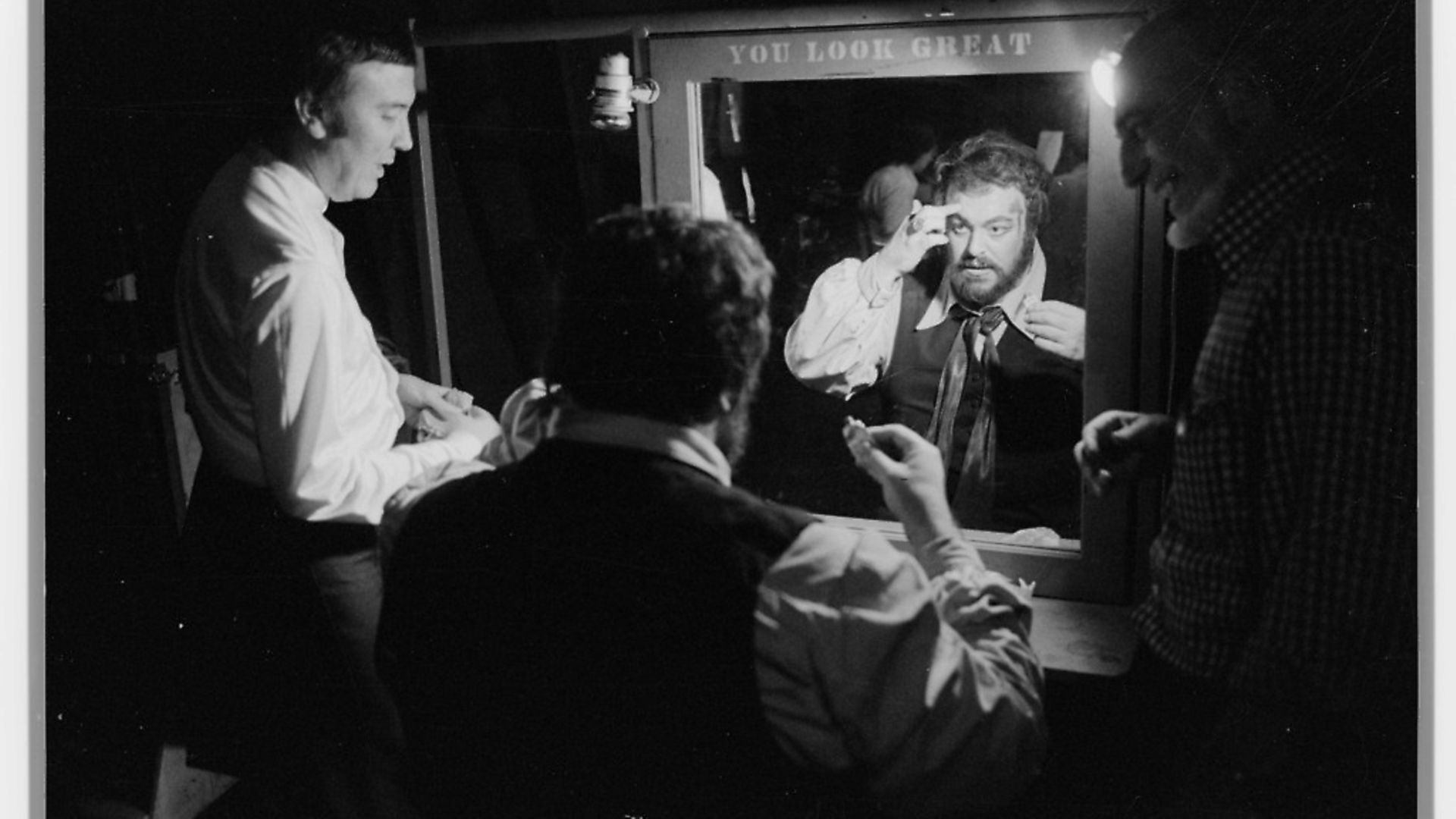Luciano Pavarotti: October 12, 1935 – September 6, 2007

If we were to reel off a list of the world’s great opera locations it’s probably a safe bet that Beech House in the north Wales village of Froncysyllte, on the busy A5 to Holyhead, wouldn’t be among them. Yet there is a case for the stern-looking Victorian red brick house next to the post office being at least in the vicinity of La Scala, Bayreuth and Glyndebourne in the pantheon of locations with deep and lasting operatic significance. In July 1955 William and Alice Griffiths had opened up their home to members of the Corale Rossini, a male voice choir from Modena in Italy who had travelled to compete at the Eisteddfod in nearby Llangollen.
A rotund baker and his cheerful 19-year-old son were among their guests, members of a choir who would carry off the festival’s International Prize with a performance described by the judges as ‘compelling and deeply moving’.
Their conductor Livio Borri was so overcome at the announcement that he fainted, but it was the baker’s son, a trainee teacher on his first trip abroad, who would ultimately provide the most dramatic and lasting legacy of that 1955 gathering. As he lay in the Griffiths’ back bedroom that night in north Wales with the applause of the audience still in his ears, Luciano Pavarotti decided to forget about teaching and make singing his career.
At the time of his death in 2007 Pavarotti was the biggest star the opera had ever produced. Instantly recognisable with his jet-black beard and immense girth, he became the superstar tenor of the modern age, transcending the elitist world of opera to become a giant of global popular culture. In his lifetime Pavarotti sold more than 100 million albums and performed to crowds of 150,000 in Hyde Park, 300,000 at the Eiffel Tower in Paris and half a million in New York’s Central Park.
Pavarotti’s rendering of the aria Nessun Dorma from Puccini’s Turandot has a strong claim to being the best-known opera performance of all time, while his first concert with Placido Domingo and Jose Carreras as the Three Tenors in Rome on the evening before the 1990 World Cup Final is arguably the most famous operatic event in history.
Nobody since the great Caruso has done more than Pavarotti to open up the closeted world of opera to new and enormous audiences, his admirers ranging from the most expensive seats at La Scala to the home ends of football grounds.
Pavarotti himself was a truly operatic character, a big man in every sense, from his waistband to his vocal capacities to his boundless charisma. His voice possessed a window-rattling immensity that for all its power retained a lyrical warmth that carried right to the back of every concert hall, each word, each syllable clearly and perfectly enunciated.
‘I think an important quality that I have is that if you turn on the radio and hear somebody sing you know it’s me,’ he said. ‘You don’t confuse my voice with any other voice.’
Pavarotti was never the greatest actor but he didn’t have to be. He lived every role through the combination of words and music, learning every part almost entirely by ear because his knowledge of musical theory was surprisingly elementary.
‘I don’t go in too deep,’ he said of his preparation for a role. ‘The musical score is one thing and the singing part is another. If you have the music in your head and you sing it with your body, you’ll be all right.’
Pavarotti knew to play to his strengths and chief among them was Italian opera, a canon from which he rarely deviated and one whose popularity was on the wane until he hauled it back into the mainstream.
He returned from the Eisteddfod, began singing lessons, gained chorus roles and eventually made his debut as a lead tenor playing Rodolfo in a production of Puccini’s La Bohème in Reggio Emilia in the spring of 1961. Within two years he was performing the same role at the Royal Opera House in Covent Garden where, tasked to understudy the great Giuseppe di Stefano, Pavarotti found himself performing almost every night as the veteran tenor struggled with his health (while the Times found ‘the newcomer from Italy’ to be ‘an attractive singer with a warm, easy, nicely-focused lyric tenor voice’, as an actor, ‘Mr Pavarotti appeared confident but dull’).
Pavarotti truly came to the notice of a global audience at the New York Metropolitan Opera in 1972. As Tonio in Donizetti’s Le Fille du Regiment he hit the nine high C’s required of the part – one of the biggest challenges facing a tenor – with such effortless ease he brought the house down, enjoying riotous applause and 17 curtain calls at the end of his first performance. ‘The King of the High C’ was launched into the operatic stratosphere.
In the years that followed, Pavarotti sang regularly on television, effectively becoming the public face of opera. His waistline expanded at a rate commensurate with his fame making him even more recognisable, practically sidelining the more svelte figures of Domingo and Carreras when they sang together as the Three Tenors during the 1990s. He toured the world, performing in venues from Beijing to Chicago via Red Square, combining opera roles with solo recitals, recording with the likes of Sting and U2 and becoming a regular on the television chat show circuit.
There were always no-shows, to the extent that in 1989 the Lyric Opera in Chicago declared they would never book him again when it emerged he had pulled out of 26 of his 41 engagements there over the previous eight years. But as time passed, the cancellations increased almost to the point where buying a ticket for a Pavarotti performance became a gamble. When he did turn up his ballooning size forced him to spend most performances seated: in Leoncavallo’s Pagliacci in New York in 1994, for example, Pavarotti as Canio was supposed to murder his wife and her lover in fit of rage but was so immobile the doomed lovers had to practically run onto his knife blade themselves.
Most worrying of all, as the millennium approached his voice didn’t seem quite what it used to be. As the rate of cancellations increased, critics speculated openly on whether it was time for the great showman to leave the stage for good. A tempestuous personal life added to the growing criticism: in his 60s he left his wife for a woman less than half his age and there was a high profile and expensive run-in with the Italian tax authorities.
A two-year global farewell tour announced in 2004 seemed to satisfy all parties, only for the singer to be diagnosed with the pancreatic cancer, in 2005, that would eventually kill him.
Pavarotti’s last major public performance came at the opening ceremony of the Turin Winter Olympics in 2006 where the ailing tenor, wrapped in a black cloak against the February cold, sang an emotionally taut, heartrending Nessun Dorma. As the final cadence died away in the chill night air and the packed stadium roared its approval Pavarotti stood with his arms outstretched and eyes screwed shut, his trademark white handkerchief in his left hand, as if he knew it might be the last time he would ever hear an ovation like it.
Maybe as he closed his eyes he thought back to his first ovation and the night he’d lain awake in Beech House, Froncysyllte, replaying it in his mind and making the decision that would change not only his life but the world of opera itself.











